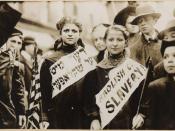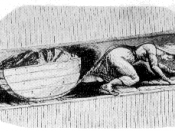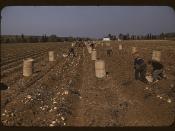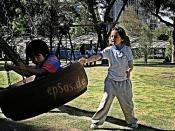Shankar is six years old. He is expected to handle the heavy instruments used to cut knots in each carpet. many many his thumbs and fingers were cut when the cutter slips. He cries for his motheybut but receives a beating instead. He is not taken to a hospital or given any medicine instead his amster fills the cut with match stick powder and then lights it, causing the skin and blood to bond. Again he cries for his mother and again he receives a beating.
I wish that I could tell you that Shankar's story is unique but unfortunately it is not. The United Nations Labour Agency estimates that there are 250 million children from ages 5 - 14 employed aroun the world. These children are making carpets, manufacturing bricks, working in glass and metal factories, in textile factories, in sugar cane fields, in the tobacco industry and they even work making toys.
The list goes on and on. Two hundred and fifty million children who will never enjoy the simple pleasures of childhood in all the ways familiar to us and our children.
A work day can be 10 12 or 14 hrs long and work is done 6-7 days a week. Often these children do not see their parents for a month a at a time. Some of them never get to see their parents. Many of them have been bonded to the company because their family had to borrow money. Because of this they have become enslaved a the debt with the accumulating interest never seems to be paid.
The abuses these children have to endure are unbeleivable. They are beaten for any reason, in fact a beating is the norm rather than unusual. Some are branded the same way we brand our cows. They are branded so that they vcan be identified as belonging to that factory. They are often kept under lock and key when they do finish their work. This ensures that if they had the motivation or energy, they are not able to escape. They are the victims of sexual abuses and are sometimes force to become prostitutes. It is common practice to keep the children hungry so they will stay awake and work. Working conditions are dangerous which often results in accidents in which many die. Hopelessness and despair become the normal way of life. All dreams that may have existed are destroyed. What kind of future do they have? Just more of the same.
It is said that this problem will exist as long as poverty exists within these countries. As long as there is poverty the children will have to work to help support their families. But does this explain the low, low wages these children are paid. Does this explain the abuses they must suffer through. Would not a more effective way of combating poverty be to educate these children: give them dreams and hopesa.I I agree with the theory that it is a matter of greed. Greed on the part of the multi-national corporations that move into the countries becuase of the cheap labour that can be found there. Thus insuring a large profit ratio.
It is also greed on the part of the goverments who encourage these companies to enter their country. although it may not benifit the people of the country, it does help fill the goverment banks. These goverments often set no legislation in terms of people working. If there is legislation that ensures minimuim wage and the amount of hours worked in a day or working conditions, they are often overlooked by the officicials. Again profits far out weigh fairness.
The are no easy solutions to combat this problem. International trade and investment seems to promote the growth of sweatshops. Many of them employing children. New tougher international labour standards need to be developed and sanctions placed on those countries that do not comply. Multi-National corporations must be accountable for the treatment of their workers as well as the age of their workers. These companies develop that state no children work in their factories and that abuses of workers of any age are not tolerated, but there are really no garauntees that these policies are being enforced. When a company such as Rebok or Nike enters a company the factory in which their producgts will be made do not appaer under the name that is recognizable by us but rather the name of the subsidary company.
I think one of the most important ways to create change is for each and every person to be concerned that these atrocitities are occuring. Not in a detached way that says I don't like it but it's not happening here, but rather once it has nauseated you. It must be taken to heart. Educate yourself and them educate the people around you. Tell local store owners what you have learned and encourage them to find out what the conditions are in the factories where thier products are produced. Write letters to people in power encouraging them to address this issue. Would you pay alittle more if the item you were about to buy was guarenteed not to have been produced by child labour. We the consumer must take resbonsibility, check the nmade in label, be aware that there is a chance that what you are about to buy may have been produced by stealing someone's dream, and then decide if you really need the item. There are groups making a difference today. One of them is Free the Children. Learn about their mandate and how you or the group you belong to can help them. Above all I encourage you to educate yourself and care. Together we can make a difference, together we can restore the dream to each and every child. They deserve it!





